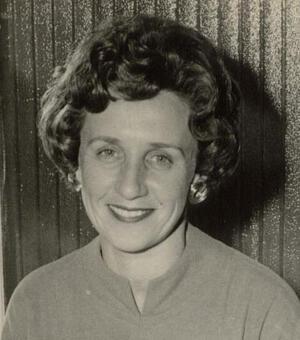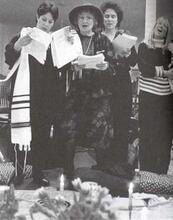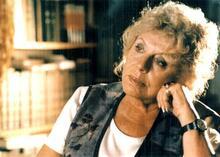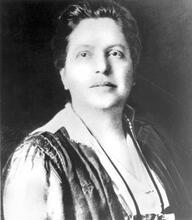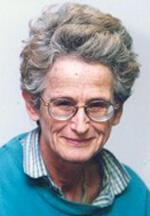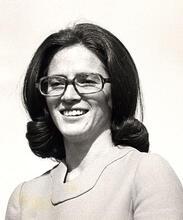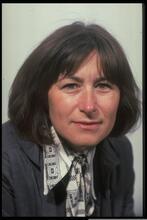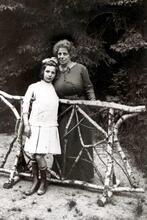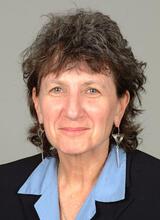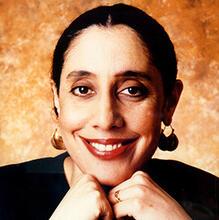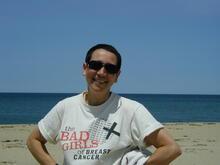Lorna Lippmann
Lorna Sylvia Lippmann was an Australian researcher and educator who devoted much of her life to the promotion of Aboriginal rights. For more than ten years she held positions in Aboriginal organizations, campaigning for improved conditions and repeal of discriminatory laws. As an academic researcher from 1964 to 1975, she authored influential publications, including a study of race relations in four country towns. Lippmann was recognized as a leading authority on Aboriginal issues and in 1973 was advisor to the Federal Minister for Aboriginal Affairs. She subsequently held government positions, including Education Officer in the Human Rights Commission. Acclaimed Aboriginal writer Kevin Gilbert commented that “Mrs. Lippmann is one of the very few whites ... who ... understand[s] ... what a truly meaningful Aboriginal policy must provide.”
Lorna Sylvia Lippmann was an Australian researcher and educator who devoted much of her life to the promotion of Aboriginal rights. She has been described as a tireless advocate and “a huge intellect, cloaked in elegance and charm” (Bullen 2004, 137). Asked to characterize her life’s work, she stated: “I am committed to social justice, maximized opportunity, and respect for all people” (Who’s Who of Australian Women).
Family and Education
Born December 21, 1921, in Melbourne, Australia, Lippmann was the daughter of Pauline (Aarons) and Philip Matenson. Her mother was second-generation Australian of Yorkshire Jewish heritage; her Russian-born father was from an Orthodox Jewish family that fled pogroms and arrived in Australia when Philip was three years of age. He qualified in medicine and practiced in the working-class suburb of Richmond. Lorna was brought up in a secular, locally prominent household, and her father taught her to read and write before she commenced school at the FJC Vaucluse Convent, located opposite her home.
After graduating from high school, Lippmann worked for eight months as a teacher’s assistant, an experience that left her resolved never to be a teacher. In 1939, she enrolled in a Bachelor of Arts degree at the University of Melbourne, majoring in French. After completing her studies in 1942, she worked in the Department of War Organization of Industry. After the war she worked for the French Chamber of Commerce.
In 1945, Lorna married Walter Lippmann (1919-1993) at Temple Beth Israel, a liberal synagogue. Walter, the eldest son of a prominent German Jewish family from Hamburg, had arrived in Australia in January 1939. The couple had two daughters, Davina and Lenora.
Walter Lippmann became a communal leader, holding executive positions in state and national Jewish organizations for more than 45 years. He served as honorary secretary of the Executive Council of Australian Jewry (1949 to 1960); held various roles in the Victorian Jewish Board of Deputies, including president (1969-1972); and was president of the Australian Jewish Welfare and Relief Society (1960-1977). He was also a key champion of immigrant welfare and one of the early Australian proponents of multiculturalism.
Combating Racial Prejudice and Bigotry
Lorna and Walter Lippmann shared a lifelong commitment to combating racial prejudice and bigotry but worked in different fields and in different roles. Walter was primarily an organizational leader and lobbyist within Jewish and migrant organizations, although he also found time for research and publication.
In contrast, Lorna was dismissive of religion and had little involvement in the Jewish community; the exceptions included talks she gave to Jewish organizations and her membership in the left-wing Australian Jewish Democratic Society (Rothfield 2004). In a 1999 interview, she stated that she had no religion (Curzon-Siggers 1999, 9:20). Her commitment was to Indigenous affairs and to fostering understanding of the sources of racial discrimination, with attention to immigrant issues later in life.
A Life-Changing Event
With Walter, Lorna Lippmann was active in the peace movement advocating for nuclear disarmament and was involved in a discussion group of socially concerned friends. Her interests were transformed when she learned in 1957 of the appalling living conditions of Aboriginal people in Western Australia’s remote Warburton Ranges.
Embarking on a process of self-education, Lippmann formed close working relationships with Aboriginal leaders, including Pastor (later Sir) Doug Nicholls. She accompanied Nicholls and others on visits to Aboriginal communities and speaking engagements. She commented later that “I used to...sit in the back row, take notes, and try to learn as much as I could” (Lippmann, interview with Susan Taffe). She subsequently joined a speaker’s agency, giving talks on Aboriginal issues, raising money, and donating her fee to the cause.
Asked to join the newly formed Victorian Aboriginal Advancement League, established in 1957, Lippmann became its Vice-President (1959-1968) and a delegate to the Federal Council for the Advancement of Aborigines and Torres Strait Islanders (FCAATSI), where she held an executive position from 1960 to 1966.
An early focus of Lippmann’s activism was the campaign to repeal state and territory discriminatory laws. In 1964 she became the convenor of FCAATSI’s legislative reform committee, and among her first publications was her contribution to the committee’s pamphlets “Principles of Aboriginal legislation” (1965) and “Legislative changes, recommendations for future action” (1966). She was heavily involved in planning, writing, and public speaking during the successful 1967 referendum campaign for constitutional change.
While Lippmann held positions within Aboriginal organizations until the late 1960s, in the context of the Black Power movement in Australia, Aboriginal-led organizations became the norm beginning in 1968. There was, however, still a role for non-Aboriginals to play in research and education, at least until increased educational opportunities made possible the emergence of Indigenous researchers. Lippmann observed that when she wrote her first book, To Achieve Our Country: Australia and the Aborigines, in 1970, “the dilemma of Aborigines [sic], the injustices which they had undergone and were continuing to undergo were just beginning to attract the attention of the general public. Literature on the then current situation was scant to the point of imperceptibility” (Lippmann 1981, x).
Academic Career
Reflecting the changed direction in her life, in 1963 Lippmann enrolled in the Department of Sociology and Anthropology at Monash University. The following year she discontinued her formal study when she was invited by the Director of the University’s newly established Centre for Research into Aboriginal Affairs, Dr. (later Professor) Colin Tatz, to take up a position as a research fellow in the Centre, a position she held from 1964 to 1975.
To deepen her knowledge, Lippmann studied first-hand the position of overseas Indigenous peoples, twice visiting Indian reservations in the United States as a guest of the Bureau of Indian Affairs and spending weeks in Maori communities in New Zealand, villages in India, and Indigenous communities in Canada and the Pacific Islands. She also met with researchers in England, the United States, and other countries to discuss race relations and initiatives to combat racism.
Over the course of her career, Lippmann authored more than 60 articles, book chapters and reports, as well as four pioneering books. She wrote primarily not for academics but for a general readership, school and university students, policy makers, and educators.
Lippmann’s writings are characterized by forthright condemnation of Australia’s racist past, documenting the ongoing devastating impact of colonialism on Aboriginal people and the unwillingness of white Australians to listen to Aboriginal elders and accord legitimacy to just demands.
The key motif of Lippmann’s work was captured in the title of her 1977 book, The Aim is Understanding: Techniques for a Multicultural Society. Understanding was the first step, informed action the second. Her work was premised on the belief that change was achievable: “certain types of educational programmes have been shown to effect positive change; and anti-racist legislation will provide the social foundation for the alteration of group attitudes” (Lippmann 1973, 15).
A particular interest was the role of schools in perpetuating prejudicial attitudes, which led Lippmann to research and publish analyses of school texts and general reading for the young to expose bias, prejudice, and veiled racism.
Lippmann’s major research project involved the study of four country towns in New South Wales and Victoria, commissioned in 1969 by the Commonwealth Office of Aboriginal Affairs. It was to lead to her 1973 book Words or Blows: Racial Attitudes in Australia, published by Penguin Books. The project, which involved her participant observation in Aboriginal communities and a survey of the attitudes of white residents, brought her face-to-face with white bigotry and its impact on Aboriginal lives: the unsanitary living conditions on the fringes of towns, unemployment, powerlessness but also resilience.
By the 1970s Lippmann was recognized as a leading academic authority on Aboriginal issues and received invitations to speak at conferences and to contribute to influential political science anthologies, including Racism: The Australian Experience (1972), Public Policy in Australia (1974), and Reform and Reaction in Australian Politics (1979). She was one of two researchers cited in the maiden speech of Australia’s first Aboriginal member of the Commonwealth parliament, Senator Neville Bonner (Parliament of Australia, 1971).
Government Positions
In 1973 Lippmann took a leave of absence from Monash University to take a position in the office of Gordon Bryant, the Federal Minister for Aboriginal Affairs in the Whitlam Labor Government, to advise on educational programs. In 1975 she resigned from Monash University to become the Victorian Director of the Office of the Commissioner for Community Relations (Canberra Times, December 17, 1976). One of her roles was to investigate individual complaints of racial discrimination. She also produced reports on the conditions of Aboriginal people in Western Australia (1977, 1979), Northern Territory (1978), Tasmania (1978), and Victoria (1980), and, reflecting a broadening of her interests, the Turkish and Indo-Chinese Communities in Victoria (1980).
From 1984 to 1987 Lippmann was Community Education Officer at the Human Rights Commission. Following her retirement, she was chair of the Ecumenical Migration Centre and from 1987 a member and subsequently part-time Chairperson of Victoria’s Immigration Review Panel, which determined appeals against decisions taken under the Migration Act (Markus 2017).
Generations of Resistance
Possibly Lippmann’s best-known work is Generations of Resistance: The Aboriginal Struggle for Justice, first published in 1981, with new editions in 1991 and 1994 and four reprints. The book served as a text for upper-secondary and tertiary students and as an accessible introduction for a general readership. It marked the summation of her broad interests in race relations and Aboriginal affairs, with a focus on Aboriginal activism and just demands.
Acclaimed Aboriginal writer Kevin Gilbert commented in 1973 that “Mrs. Lippmann is one of the very few whites in this country who has arrived at a clear understanding of what a truly meaningful Aboriginal policy must provide for the Aboriginal people” (Lippmann 1973, back cover).
Lorna Lippmann died on June 16, 2004. She has been posthumously honored by having a Canberra Street named after her and by having an annual Monash University scholarship in her name awarded to an Aboriginal student. Her contribution is recognized in Australian museums.
Selected Works by Lorna Lippmann
Books
To Achieve Our Country: Australia and the Aborigines. Melbourne: Cheshire, 1970.
Words or Blows. Racial Attitudes in Australia. Ringwood, Victoria: Penguin Books, 1973.
The Aim Is Understanding: Techniques to Promote Better Intergroup Relations. Artarmon, N.S.W.: ANZ Book Co., 1973. Second edition, The Aim is Understanding: Educational Techniques for a Multicultural Society. Sydney: ANZ Book Co., 1977.
Generations of Resistance. Melbourne: Longman Cheshire, 1981 first edition, 1991 second edition, 1994 third edition.
Book chapters
“Aboriginal-white attitudes: a syndrome of race prejudice.” In Racism: the Australian Experience. Volume 2, edited by F. S. Stevens, 25-34. Sydney: ANZ Book Co., 1972
With A. Barry Pittock. “Aborigines.” In Public Policy in Australia, edited by Ray Forward, 55-94. Melbourne: Cheshire, 1974.
“The Aborigines.” In From Whitlam to Fraser: Reform and Reaction in Australian Politics, edited by Alan Patience and Brian Head, 173-88. Melbourne: Oxford University Press, 1979.
Note: The assistance of Lorna Lippmann’s family in providing information for this biographical entry is gratefully acknowledged.
Bullen, Margaret. “Lorna Lippmann: 21 December 1921-16 June 2004.” Australian Aboriginal Studies 2004, no. 2: 137-38.
Commissioner for Community Relations, Annual Report, 1976-1980.
Human Rights Commission, Annual Report, 1981-1982.
Lippmann, Lorna. Interviewed by Helen Belle Curzon-Siggers, August 25, 1999. Bringing them Home Oral History Project. National Library of Australia, at http://catalogue.nla.gov.au/Record/297317?lookfor=lippmann,%20lorna&off…. Sound recording.
Lorna Lippmann papers, privately held.
“Lorna Lippmann.” Monash Biographical Dictionary of Twentieth Century Australia. General Editors John Arnold and Deirdre Morris. Port Melbourne, Vic.: Reed Reference, 1994.
“Lorna Lippmann.” National Museum of Australia, Collaborating for Indigenous Rights, at https://www.nma.gov.au/explore/features/indigenous-rights/people/lorna-… .
“Lorna Lippmann.” Who’s Who of Australian Women, Complied by Andrea Lofthouse. Sydney: Methuen Australia, 1982.
Markus, Andrew. “Lippmann, Walter Max (1919-1993) and Lippmann, Lorna (1921-2004.” Shared entry. Australian Dictionary of Biography. National Centre of Biography, Australian National University, published online 2017, at https://adb.anu.edu.au/biography/lippmann-walter-max-18257 and https://adb.anu.edu.au/biography/lippmann-lorna-18258 .
National Library of Australia, Trove, newspaper references to talks in the Jewish community: Australian Jewish News, July 8, 1960, May 11, 1962, September 6, 1963, March 24, 1972, November 8, 1985, August 22, 1997, September 19, 1997, October 21, 1977, Australian Jewish Times, October 5, 1972.
Parliament of Australia. Senate Hansard. 1971, no. 36, September 8, 1971: pp. 553-556 (maiden speech of Senator Neville Bonner).
Rani Kerin. Making a Difference: Fifty Years of Indigenous Programs at Monash University 1964-2014. Clayton, Victoria: Monash Publishing, 2016.
Rothfield, Norman. “Vale Lorna Lippmann 1921-2004.” Australian Jewish Democratic Society Newsletter, July-August 2004.
Taffe, Susan. Black and White Together. FCAATSI, the Federal Council for the Advancement of Aborigines and Torres Strait Islanders, 1958-1973. St. Lucia, Qld.: University of Queensland, 2005.
Taffe, Susan. Interview with Lorna Lippmann, November 21, 1996. Federal Council for the Advancement of Aborigines and Torres Strait Islanders Oral History Project, typescript, privately held.

